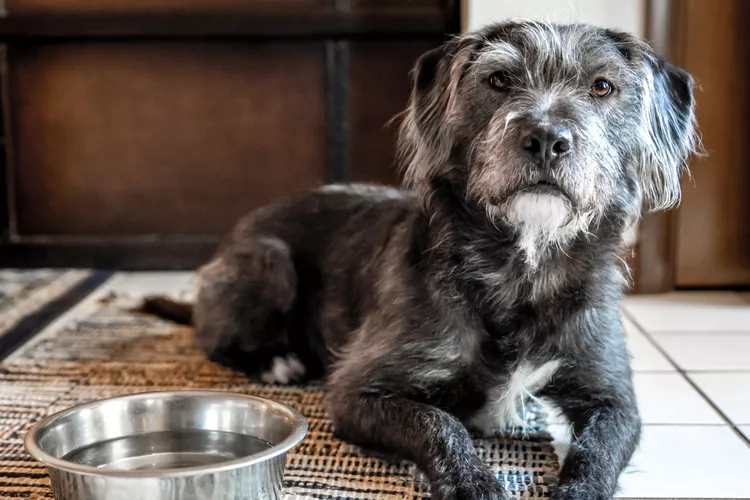Why Is My Senior Dog Drinking a Lot of Water?

A senior dog drinking a lot of water could be a sign of a health problem. Typically, a dog drinks about one cup of water per 10 pounds of body weight, so if your pup starts drinking much more, you should take note.
Some common causes of a dog suddenly drinking a lot more water include kidney failure, diabetes mellitus, Cushing's disease, or simply dehydration, all of which need to be addressed. If you notice your senior dog is drinking more water than usual, plan a visit to the vet.
Causes of Increased Water Intake
Increased water intake can be a sign of many different conditions. Kidney failure, diabetes mellitus, and Cushing's disease are the most common causes in senior dogs. Increased water consumption may also be seen with dehydration, however, this condition may be seen in dogs of all ages.
Kidney Failure
The kidneys serve many roles, one of them being water conservation. Hydration of the body depends on both water consumption as well as the removal of water. In times of dehydration, the kidney must respond by conserving water. This means that all the materials the body needs to get rid of still need to be removed, but the kidney needs to manage this using the smallest amount of water possible. A pet with impaired kidney function will have a difficult time concentrating urine and will need to drink extra water to process the body's waste chemicals.
Diabetes Mellitus
Diabetes mellitus is caused by a deficiency of insulin in the body. Insulin is necessary to remove glucose (sugar) from the bloodstream, and when it is low or absent, there is a buildup of glucose in the blood. Normally, the kidneys conserve the bloodstream's glucose, but their filtering function can be overwhelmed with the blood sugar is very high. This excess glucose ends up spilling into the urine and draws extra water with it, leading to the hallmark signs of increased thirst and urination.
Cushing's Disease
Cushing's disease, also known as hyperadrenocorticism, is a hormonal imbalance that results from excessive cortisol in the bloodstream. The symptoms stem from long-term overexposure to this hormone. Excessive drinking and urination are common signs; however, they usually have a gradual onset, and owners might think it's just part of the normal aging process. Additional symptoms that may help your veterinarian distinguish it from other conditions are given below.
Dehydration
Dehydration is common and can be a cause of increased water intake. This condition can occur in dogs of all ages and can be potentially life-threatening. A skin turgor test can be performed at home. If the skin is slow to return to position, your dog may be moderately to severely dehydrated. If the skin does not return fully to its position, your dog may be severely dehydrated and possibly in critical condition. This test is not always accurate, so if you suspect your dog may be dehydrated, seek veterinary attention immediately.
Diagnosing the Cause of Increased Water Intake
Your veterinarian will run some lab tests to determine which condition is causing increased water consumption. Each will require a blood chemistry panel, which will evaluate major organ systems and electrolytes. They will also run a complete blood count to assess the red and white blood cells, as well as a urinalysis. The table below describes what is used to determine the right condition.
What to Expect at the Vet
If your senior dog is drinking more water than normal, it is time to visit your veterinarian. But before the visit, make sure to write down any questions you would like to ask. Bringing notes describing your dog's drinking and urinary behaviors may be helpful. Also, consider contacting the office ahead of time to see if they would like for you to bring in a urine sample. The more prepared you are, the less stressful the visit will be for you and your dog.
Once at the office, the vet will perform a head-to-paw examination and perform the necessary diagnostics. Based on history, exam, and testing, a diagnosis will be made. Sometimes a diagnosis is not obvious, and more testing is needed. Your veterinarian will go over all testing and recommendations for treatment. No matter what the cause of increased water consumption, your veterinarian will work with you to provide the best possible outcome for your senior dog.